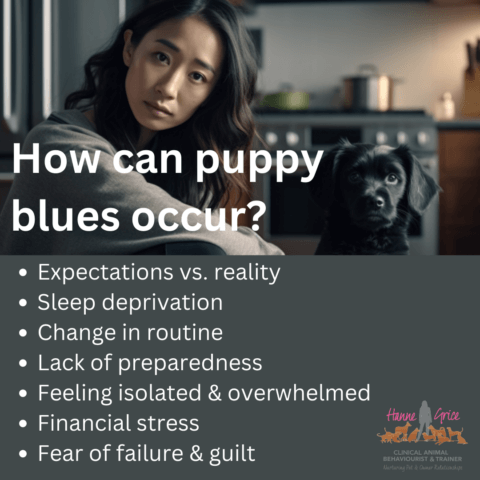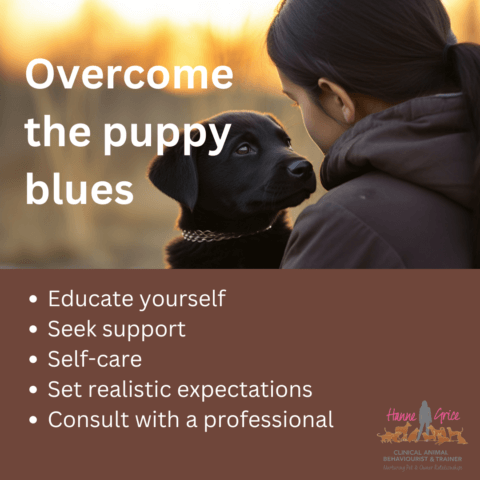Bringing a new puppy into your home is an exhilarating experience filled with joy, playfulness, and the promise of a loyal furry friend. However, for many new dog owners, this initial excitement can be overshadowed by feelings of regret, anxiety, and even sadness. This is often referred to as the “puppy blues”, and is not uncommon. But why do they occur and how can you navigate these feelings to foster a strong bond with your new puppy? Read on…
What are the Puppy Blues?
The term “puppy blues” describes the feelings new dog owners may experience shortly after bringing their puppy home and these emotions can include regret, anxiety, and overwhelm. Such feelings can be surprising for owners, especially when contrasted with the joy and anticipation of adopting a new pet. The puppy blues can be linked to several psychological principles:

- Expectation vs. reality: Before getting a puppy, many people have an idealised vision of what puppy ownership will be like. When faced with the reality of puppy behaviour, such as biting, jumping up, vocalising, ‘collecting’ an array of items around the property, and toilet training challenges, the disparity between expectation and reality can lead to disappointment.
- Sleep deprivation: Puppies often disrupt sleep patterns, leading to fatigue. Sleep deprivation can exacerbate feelings of irritability and sadness. In turn, owners may become more easily frustrated with their puppy – increasing the risk of the owner shouting at and manhandling the puppy. This can make matters worse, as the puppy can start to become anxious about the unpredictability of the owner’s behaviour and by the time the young dog starts puberty (from around 6 months onwards), common puppy problems such as jumping up, grabbing/biting and taking items, may have escalated into behavioural issues such as resource guarding and more.
- Change in routine: Bringing a puppy home means a significant change in daily routines. Humans are creatures of habit, that means any change is stressful. Hence, sudden change – like getting a new puppy and dealing with the demands they bring – can lead to feelings of stress and unease.
- Overwhelm: Juggling the responsibilities of puppy care with existing commitments like family life and work can amplify feelings of being overwhelmed. This can be especially challenging for individuals who already have a full plate and are now trying to integrate a demanding puppy into their routine, and may also regularly receive conflicting advice from well-meaning friends, family or other dog owners.
Why Do Puppy Blues Occur?
There are several factors that can contribute to the onset of the puppy blues. These include but are not limited to:
- Lack of preparedness: Many new dog owners underestimate the amount of time, effort, and patience required to train and care for a puppy.
- Isolation: Especially in the early days, taking care of a puppy can be all-consuming, leading to feelings of isolation from friends and loved ones. This may even cause arguments within the family home, for example, where one person is the primary carer. They may feel others are not ‘pulling their weight’, being consistent with how they are attempting to train the puppy or with any boundaries they are trying to establish, such as whether the puppy is allowed to go onto the sofa or not, and even have cross words over night time puppy sleeping arrangements.
- Financial stress: Unexpected expenses related to puppy care can add financial stress. This can include training services, pet care costs (e.g., dog walker, day care, home sitter etc), puppy-related products, veterinary costs, and more.
- Fear of failure: New owners might fear they’re not doing a good job or that they’ve made a mistake in getting a puppy. This can be exacerbated where owners might compare their puppy to a previous dog they may have owned, or compare their situation to a friend’s puppy dog experience. They may have tried different handling methods to tackle common puppy problems like biting and grabbing or toilet training but nothing seems to work and this can cause frustration for owners, as well as the puppy – often compounding the issue[s] and the owner’s sense of failure.
- Guilt: New dog owners might also experience guilt for various reasons, such as not spending enough time with the puppy, feeling like they’re not providing adequate care, or even questioning their decision to adopt in the first place.
Overcoming the Puppy Blues
There are a number of ways in which new puppy owners can overcome puppy blues. This includes:

- Educate yourself: The more you know about puppy behaviour and training, the better equipped you’ll be to handle challenges. Ensure any resources you read, listen to or watch are from reputable trainers and behaviourists who are providing up to date advice and information. A good start for free articles and advice includes Battersea, RSPCA and Blue Cross. Whilst you have a puppy and are waiting for their vaccinations to be completed, there is a lot of great stuff you can be doing with your puppy; for troubleshooting support, training skills, advice and more, then check out my Puppy Package – an online one-stop-shop for all your puppy needs. Do also consider joining an in-person puppy training class that focuses on positive reinforcement-based methods. Go and visit the classes to get a feel for how they are run and the handling methods used. Check out the Animal Behaviour & Training Council website for a list of assessed and certified practitioners in your area.
- Seek support: Connect with other dog owners, whether it’s through local dog groups, online forums, or social media. Sharing experiences and seeking advice can be therapeutic. Ensure the online communities you join are focused on up-to-date handling methods – for example, check out Modern Dog Training & Behaviour, and the Behaviour Collective.
- Self-care: Ensure you’re taking time for yourself. Whether it’s a short break, a walk without your puppy, or practicing relaxation techniques, self-care is crucial.
- Set realistic expectations: Understand that every puppy is unique, and challenges are a normal part of the journey. Celebrate small victories and be patient with both yourself and your puppy.
- Consult with a professional: If feelings of anxiety persist and or your puppy’s behaviour is escalating and you do not know what to do, contact your veterinary surgeon in the first instance to discuss your dog’s needs and how you can be supported. For example, vets can refer owners onto a Clinical Animal Behaviourist who can support you to reduce the overwhelm; this includes the opportunity to talk through your situation thoroughly, provide appropiate guidance specific to you and your puppy, and structured treatment plans etc. Additionally, charitable organisations are available to everyone, if you simply want to talk to someone who understands the impact stress and anxiety can have, such as the Samaritans.
Key take-aways
Adopting a new puppy is a journey filled with highs and lows. While the joys of pet ownership are immeasurable, it’s essential to recognise and validate the challenges that come with it. The “puppy blues” are a natural part of this journey for many. By understanding the underlying causes and equipping oneself with knowledge, support, and self-care strategies, new dog owners can navigate these feelings effectively. Remember, every challenge faced with your puppy today lays the foundation for a bond that will enrich your life for years to come. Embrace the journey, seek appropiate support when needed, and cherish the unique and rewarding relationship you’re building with your four-legged friend.
References
- Ersche, K.D, Lim, T, Ward, L.H.E, Robbins, T.W., Stochl, J. 2017. Creature of Habit: A self-report measure of habitual routines and automatic tendencies in everyday life. Personality and Individual Differences. 116:73-85; doi:10.1016/j.paid.2017.04.024.
- Keller Center for Research: Baylor University (no date) Keller Center for Research | Baylor University. Available at: https://www.baylor.edu/business/kellercenter/news.php?action=story&story=224638.
- Lerner, J.S, Li, Y., Valdesolo, P., Kassam, K.S. 2015. Emotion and Decision-Making. Annual Review of Psychology. 66(1): 799-823
- Thompson, M. 2019. The Overwhelm Factor: Balancing Work, Family, and Pets. Journal of Modern Lifestyle. 5(1);45-53.
- Vandekerckhove, M, Wang, Y.L. 2017. Emotion, emotion regulation and sleep: An intimate relationship. AIMS Neurosci. 1;5(1):1-17. doi: 10.3934/Neuroscience.2018.1.1.
Learn more about our classes

Get Hanne's book, clothing and more
Hanne has a number of publications including her book Playing With Your Dog to help owners work out the games that are best suited for their pet to play throughout his life, from puppyhood to old age, available from Amazon. Check out Hanne's range of contemporary casuals The Collection – for pet lovers made from recyclable, organic materials that are sustainably sourced.

